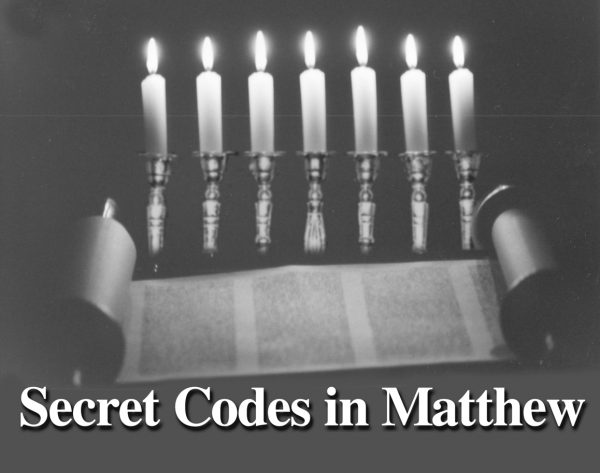The Secret Codes in Matthew: Examining Israel’s Messiah, Part 4, by Kevin M. Williams

“Now when He heard that John had been taken into custody, He withdrew into Galilee” (Matthew 4:12).
This verse is not, as some might think, God incarnate fleeing danger. Rather, it is possible that this was in fulfillment of John’s words about Jesus, “He must increase, but I must decrease” (John 3:30).
John understood, as each of us eventually must, that the Messiah had to become preeminent. John understood that his own ministry was drawing so much attention that, as we have studied earlier, Jerusalem was coming out to be immersed by him—even Pharisees and Sadducees. We don’t know how many men and women this represents, but enough lives were being transformed that many were wondering if John was the Messiah (Luke 3:15).
But the example we have is that John was servant to the greater good. Jesus claims, “Truly, I say to you, among those born of women there has not arisen [anyone] greater than John the Baptist” (Matthew 11:11), yet John knows, “He [Messiah] must increase, but I [his servant] must decrease”
How many times do leaders become the focus of ministries? How many times do we hear about so-and-so coming to town and wonder what the Holy Spirit is going to do, when in fact, we should know that the Holy Spirit is in town, and wonder what He is going to do through any willing servant?
The tone of much of the Tanakh (the Hebrew Scriptures) is that God does not desire offerings and sacrifices as much as He desires a broken and contrite spirit (Psalm 51:17). This was memorialized and epitomized in John, as it certainly should be in the Messiah’s Bride.
Jesus’ withdrawal into the Galilee was not due to intimidation, but because John’s arrest was a clear and evident signal that the ministry of the Messiah would begin outside Jerusalem.
Natural reasoning, natural man would ask, “Why not in Jerusalem?” After all, “The truth was there: exposition, exegesis, hagiology, eschatology, soteriology, christology, theology, apologetics, doctrine. The books were kept there: here were the oracles, the covenants, the ceremonies, the priesthood, the temple; the schools for the scribes, the colleges of both Pharisee and Sadducee; well, God was there, and there exclusively.”1
Does this sound like an apt description of our churches, Christian schools, and seminaries? Yet is this really were the ministry of God takes place?
Our answer lies in the Torah. For all of its lists of do’s and don’ts, the Torah is the truth of the Almighty, and it contains many, many valuable pictures for our day.
Why did Jesus begin in the Galilee? Let’s look to Moses for our answer.
Moses took his tent and pitched it outside the camp, far from the camp, and called it the tabernacle of meeting. And it came to pass [that] everyone who sought the Lord went out to the tabernacle of meeting which [was] outside the camp (Exodus 33:7).
What do we know about “outside the camp?” We know that it is where the unclean and rejected of society lived. Some were there only temporarily, perhaps through contact with blood in battle. Others were there indefinitely, resulting from tzaaras (often translated as leprosy), or they were from the mixed multitude that came with Israel out of Egypt—the gentiles.2
Category: Biblical Studies, Pneuma Review, Winter 2002


